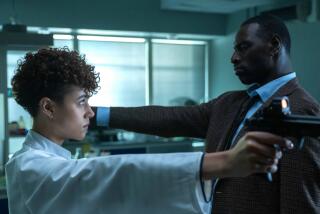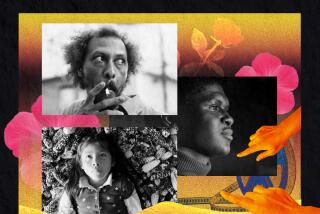L.A. Times critics’ favorite foreign films from 2011
Our film critics recap some of the foreign-language films they’ve particularly enjoyed this year.
Detective Dee and the Mystery of the Phantom Flame: If you’ve got a hankering for some old-fashioned Hong Kong action-fantasy entertainment brought up to date with nifty special effects and sterling production values, the epic “Detective Dee and the Mystery of the Phantom Flame,” directed by canny veteran Tsui Hark, is for you. “Detective Dee’s” plot doesn’t make a lot of sense, but who needs sense when you have talking deer, stars such as Andy Lau and Bingbing Li and martial-arts action choreographed by the veteran Sammo Hung? The film takes you back to AD 690 and involves a fierce female empress fighting to survive, the world’s largest Buddha and folks that burst into flame for no apparent reason. Good thing the redoubtable Detective Dee is on the case. — K.T.
City of Life and Death: The life and death of the human spirit is as much at stake as anything else in Chinese director Lu Chuan’s exquisite portrait of Nanking in 1937 as the Japanese army laid waste to the Chinese capital. After six short devastating weeks, as many as 300,000 Chinese, most of them not soldiers, had been killed; to capture the scale of the death, the film is at times sweeping. With the blink of an eye, the turn of a head, the filmmaker then narrows the focus to the achingly intimate costs of war. The telling is made more powerful by the director’s decision to shoot in black and white, as if history itself had been dusted off and brought back for another look. The brutality is unstinting — bodies falling, screams rising. It is made more bearable by small moments of grace and heroism in the face of death that will break your heart. — B.S.
Le Havre: A droll ode to the downtrodden and dispossessed, “Le Havre” joins the Finnish writer-director Aki Kaurismäki’s unmistakable stylistic flourishes with two things that are relatively new to his repertory: an overt social conscience and a sweet-natured fairy tale sensibility. “Le Havre” is the story of a ne’er-do-well shoeshiner who gets involved with an on-the-run young African migrant. The film above all adheres to Kaurismäki’s aesthetic of expressionlessness: His actors must convey what they’re feeling without changing the look on their faces. If you get on the writer-director’s wavelength, this sensibility has a euphoric effect that is heightened by such faux-serious lines as “money moves in the shadows,” “the Mediterranean has more birth certificates than fish” and “your bill is as long as the Congo River.” — K.T.
Point Blank: Unfolding at a blistering clip from its slam bang opening through its bravura close, this tip-top French thriller grips you at Frame 1 and doesn’t let go. Its story of an ordinary man facing extraordinary peril doesn’t go anywhere we haven’t gone before, but the pleasure of seeing material presented with such crisp élan is an intense one. Director Fred Cavayé is a former fashion photographer with an intuitive understanding of the dynamics of action and tension and a parallel gift for making things really move on-screen. Likely to be remade, “Point Blank” stands as an energetic rebuke to a sclerotic Hollywood system that can’t seem to create them like this anymore. — K.T.
A Separation: In “A Separation,” Iranian writer-director Asghar Farhadi has given us a different sort of war story as a married couple struggles with the idea of divorce. The filmmaker captures the essence of cultural change in the conflict between husband and wife, wonderfully rendered by Peyman Moaadi and Leila Hatami. Separations are always messy periods of adjustment, and a bizarre twist of fate complicates things even more here. The tragedies large and small that result are personal as much as political, religious or cultural, and Farhadi has managed the various divides masterfully. In doing so, he has given us a slice of a changing Iran while reminding us just how universally difficult any marriage can be. — B.S.
The Skin I Live In: In a sense, Spanish filmmaker Pedro Almodóvar is almost always playing around with who we are and what makes us that way. But he’s never been more surgically precise about examining the nature of identity than in the cerebral thriller/Frankenstein parable of “The Skin I Live In.” The drama unfolds around a plastic surgeon that Almodóvar may have created but Antonio Banderas has made terribly and terrifically mad. The doctor is re-engineering a very particular body, a beauty beautifully played by Elena Anaya. It is seductive to watch the pair tease out their emotions, leaving the filmmaker time to piece together the twisted tale of why “he” and “she” are who they are. — B.S.
More to Read
The biggest entertainment stories
Get our big stories about Hollywood, film, television, music, arts, culture and more right in your inbox as soon as they publish.
You may occasionally receive promotional content from the Los Angeles Times.












